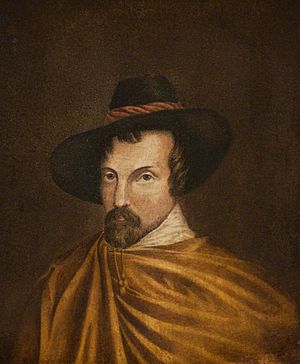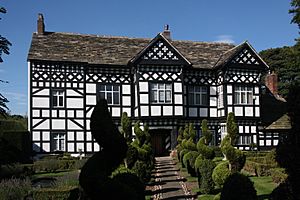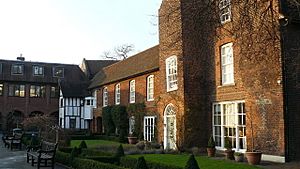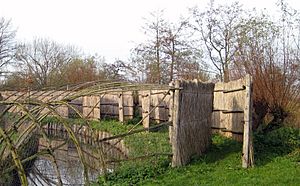Sir William Brereton, 1st Baronet facts for kids
Quick facts for kids
Sir
William Brereton
|
|
|---|---|

Sir William Brereton, 1st Baronet
|
|
| Member of Parliament for Cheshire |
|
| In office November 1640 – April 1653 |
|
| English Council of State | |
| In office December 1652 – February 1653 |
|
| Personal details | |
| Born | 13 September 1604 Handforth |
| Died | 7 April 1661 (aged 56) Croydon Palace |
| Resting place | St John Baptist Churchyard, Croydon Minster |
| Spouses | Susanna Booth (1623–1637) Cicely Mytton (1641–1649) |
| Relations | William, Baron Brereton (1611–1664) |
| Children | One son, three daughters |
| Parents | William Brereton (1584–1610); Margaret Holland (1585–1609) |
| Alma mater | Brasenose College, Oxford |
| Occupation | Landowner and soldier |
| Military service | |
| Allegiance | |
| Years of service | 1643 to 1646 |
| Rank | Major-General |
| Commands | Commander, Parliamentarian forces Cheshire |
| Battles/wars |
|
Sir William Brereton, 1st Baronet (born September 13, 1604 – died April 7, 1661) was an important English politician and soldier. He was a landowner from Cheshire and believed in religious freedom.
He served as a Member of Parliament (MP) for Cheshire at different times between 1628 and 1653. During the First English Civil War, he led the Parliamentarian army in the North Midlands.
In the 1630s, he traveled a lot through France, the Netherlands, Scotland, and Ireland. His travel diaries from 1634 and 1635 were later published. His notes and letters from the Civil War are very important. They help us understand how Parliament managed local areas during the war.
Even though he had no military experience, he was a strong and skilled leader. By the end of the First Civil War in 1646, he was one of the most powerful people in England. However, he later stepped back from his local jobs. He was asked to be a judge at the trial of King Charles I in 1649 but chose not to go.
He was chosen for the English Council of State in 1652 and 1653. But he rarely attended meetings. He lived a quiet life in London. He returned to Parliament in 1659 until it ended in 1660. Sir William Brereton died on April 7, 1661.
Contents
Early Life and Family

William Brereton was born on September 13, 1604, at his family's home, Handforth Hall. He was the oldest son of William Brereton (1584–1610) and Margaret Holland (1585–1609). Sadly, he became an orphan when he was only six years old. His grandfather, Richard Holland, became his guardian.
Besides Handforth Hall, he inherited over 3,000 acres of land from his parents. In 1623, he married Susanna Booth. She was the daughter of Sir George Booth, another important landowner in the area.
William and Susanna had four children: Susanna (born 1627), Thomas (1632–1674), Frances (1635–1676), and Catherine (around 1637). Susanna died in 1637. In 1641, he married his second wife, Cicely Mytton. She was a wealthy widow from Staffordshire. They had one daughter, Cecilia (around 1642–1704). Cicely died in 1649. In his will, William left £1,000 to both Catherine and Cecilia.
Education and Early Career
William Brereton finished his studies at Brasenose College, Oxford, in 1621. After that, he studied law at Gray's Inn before he got married in 1623. Gray's Inn was like a special school for lawyers. There, he became friends with John Bradshaw. Bradshaw was a lawyer from Cheshire who later became the judge at King Charles I's trial.
Like his grandfather and father-in-law, Brereton was a strong Puritan. Puritans were people who wanted to make the Church of England more "pure." They wanted to change its rules and practices. Some Puritans, called Presbyterians, wanted the Church of England to be more like the Church of Scotland.
Brereton seemed to agree with "Independents." These were people who believed that churches should be free from government control. He supported a radical preacher named Samuel Eaton. He also liked the ideas of Sir Henry Vane the Younger in 1641.
Brereton was made a Deputy lieutenant for Cheshire. He was also a very active Justice of the Peace (JP). A JP is a local judge who helps keep the peace. He attended over 80% of the court sessions between 1625 and 1641. This was much more than most other people in that role.
In 1627, he was given the title of baronet. This was a special honor, and he received it for helping to pay for 30 soldiers in Ireland for three years. In 1628, Brereton was elected as a Member of Parliament (MP) for Cheshire. King Charles I closed Parliament in 1629. He did not call another Parliament until 1640. This time was known as the "Eleven Year Tyranny."
In the summer of 1634, Brereton visited the Dutch Republic (modern-day Netherlands). He later wrote a detailed book about his travels. He brought back an idea from the Dutch: duck decoys. These were special traps to catch ducks. He built them on his land. This caused problems with his neighbors. They said it stopped them from hunting and hawking.
Another one of his journals described his trip through North East England, Scotland, and Ireland in 1635. He also visited France and possibly Northern Italy. However, these writings have not been found.
Brereton did not like taxes that were collected without Parliament's approval. But he still paid a tax called Ship Money. He did not get involved much in the political arguments of the late 1630s. His main interest was religion. He strongly disagreed with Archbishop William Laud's changes to the Church of England.
In 1640, he was re-elected as MP for Cheshire in both the Short and Long Parliaments. He joined several Parliament committees that focused on religion. In early 1641, he helped organize a petition from Cheshire. This petition asked for bishops to be removed from the Church of England. He also supported removing church monuments, which was called Iconoclasm.
Leading in the English Civil War
In October 1641, the Irish Rebellion began. Brereton helped send soldiers and supplies from Chester to Ireland. When the First English Civil War started in August 1642, he was a clear choice to lead the Parliamentarian forces in that area.
However, most of the important people in Cheshire supported the King (they were Royalists). This included his cousin, William, Baron Brereton. So, Sir William Brereton had to go back to London.
At the start of the war, some important people in Cheshire tried to stay neutral. In December 1642, they signed the Bunbury Agreement. This agreement asked for an end to the fighting in their area. But it was impossible to make everyone follow it.
In March 1643, Parliament sent Brereton back to Cheshire with 500 men. There, he joined 2,000 local volunteers. Even though he had no military experience, he quickly became a strong and determined commander. He won two small but important battles at Middlewich and Hopton Heath. He set up his main base at Nantwich. Soon, he gained control over Arthur Capell, the Royalist commander in Shropshire, Cheshire, and North Wales.
Over the next few years, Brereton led a strong and constant campaign. He fought across the North Midlands. One of his key officers was Colonel Robert Venables, a long-time family friend. Their actions forced the Royalists to send soldiers from other areas. This was because Chester was vital for moving men and supplies from their supporters in Ireland and North Wales.
In October 1643, Lord Byron replaced Capell as the Royalist commander. Byron gathered an army of over 5,000 soldiers. Many of them were experienced fighters from the war in Ireland. Brereton's forces were defeated at Second Middlewich in December. So, Brereton asked Sir Thomas Fairfax for help.
At Nantwich in January 1644, their combined army completely defeated Byron. Byron lost over 1,500 men, most of his cannons, and his supplies. For most of the next two years, he was trapped in Chester.
At Malpas in August 1644, Brereton became even more famous. He defeated Royalist cavalry led by Marmaduke Langdale. These soldiers had escaped from the defeat at Marston Moor. Because of his success and influence, Brereton was one of the few people who did not have to follow the Self-Denying Ordinance in February 1645. This rule said that army officers could not also be Members of Parliament.
Chester finally surrendered in February 1646. In March, Brereton fought in the last major battle of the war at Stow-on-the-Wold. He then surrounded Lichfield, one of the last places the Royalists held in England. Lichfield gave up in July 1646.
More than 2,000 of his letters from this time still exist. They are a very important source for understanding how Parliament managed things during the war. They also show the disagreements within Parliament. Brereton was part of the 'War Party'. These people believed that winning the war was necessary before talking to King Charles. The 'Peace Party' wanted to negotiate.
Life After the War

Historian John Morrill said that in 1646, Brereton was "one of the most powerful and influential men in England." As a reward for his service, Parliament gave him control of Eccleshall Castle and Croydon Palace. Eccleshall Castle belonged to the Bishop of Lichfield. Croydon Palace belonged to the Archbishop of Canterbury.
After an event called Pride's Purge in December 1648, he kept his seat in the Rump Parliament. He was also chosen to be a judge for the trial of King Charles I in January 1649. However, he did not attend the trial.
During the time of the Commonwealth of England, he lived a quiet life at Croydon Palace. He was elected to the English Council of State in 1651 and 1652. But he rarely went to meetings. We don't know exactly why he lived so quietly. Some people think he was disappointed with the religious and political situation after the war.
In the 1656 election, he tried to become an MP for Cheshire again. But he lost. When the Long Parliament met again in 1659, he took his seat once more. But he did not run for election in the Convention Parliament.
After the King returned to power in 1660 (this was called the Stuart Restoration), Brereton had to give back the church properties he had been given. But he was allowed to stay at Croydon Palace. He died there on April 7, 1661. His body was first sent north for burial. But there was an accident, and his coffin was temporarily lost in a river. It was found and brought back to Croydon. Records show he was buried in Croydon Minster.
Images for kids
-
State apartments of Croydon Palace, now part of a private school
 | Jackie Robinson |
 | Jack Johnson |
 | Althea Gibson |
 | Arthur Ashe |
 | Muhammad Ali |




